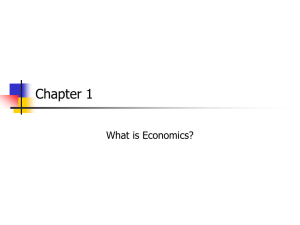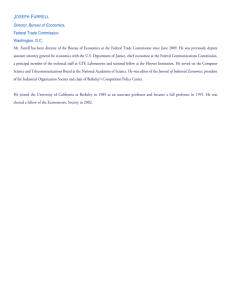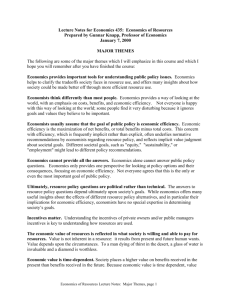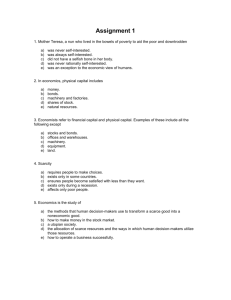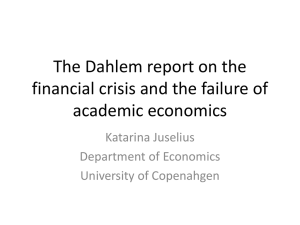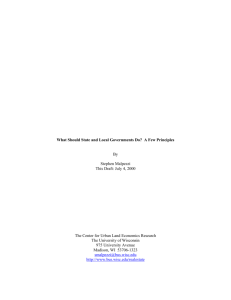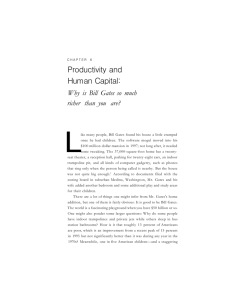GREG MANKIW'S BLOG
advertisement
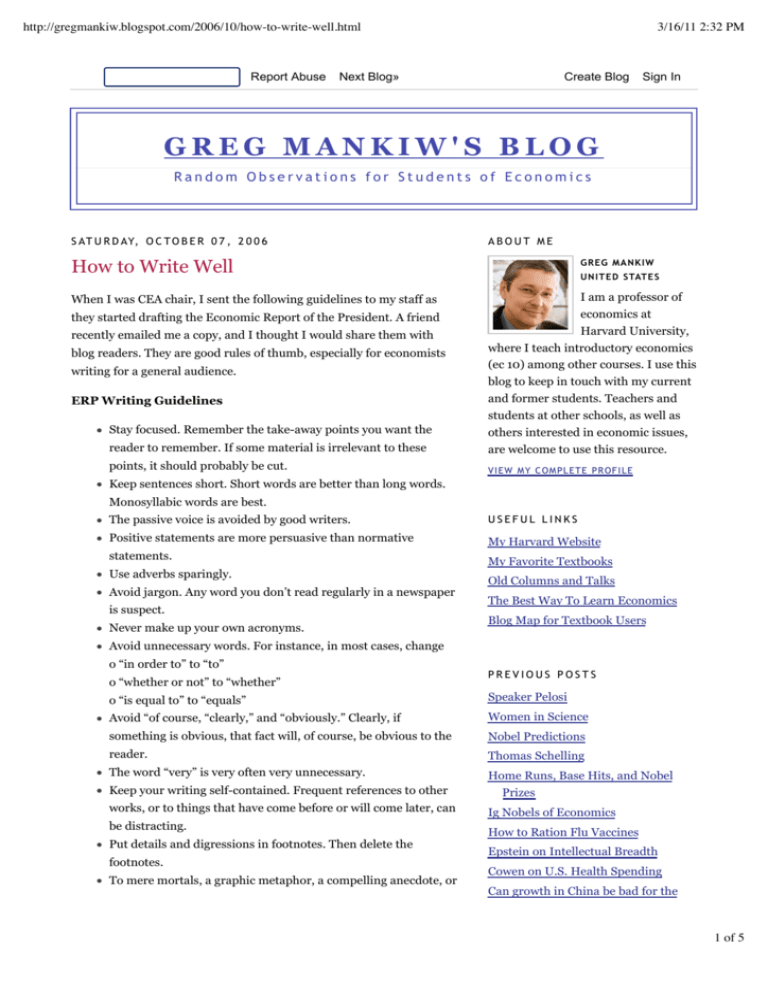
http://gregmankiw.blogspot.com/2006/10/how-to-write-well.html Report Abuse 3/16/11 2:32 PM Next Blog» Create Blog Sign In GREG MANKIW'S BLOG Random Observations for Students of Economics S AT U R D AY, O C T O B E R 0 7 , 2 0 0 6 ABOUT ME How to Write Well When I was CEA chair, I sent the following guidelines to my staff as they started drafting the Economic Report of the President. A friend recently emailed me a copy, and I thought I would share them with blog readers. They are good rules of thumb, especially for economists writing for a general audience. ERP Writing Guidelines GREG MA NKIW UNITED STATES I am a professor of economics at Harvard University, where I teach introductory economics (ec 10) among other courses. I use this blog to keep in touch with my current and former students. Teachers and Stay focused. Remember the take-away points you want the students at other schools, as well as others interested in economic issues, reader to remember. If some material is irrelevant to these are welcome to use this resource. points, it should probably be cut. V IEW MY COMPLETE PROF ILE Keep sentences short. Short words are better than long words. Monosyllabic words are best. The passive voice is avoided by good writers. USEFUL LINKS Positive statements are more persuasive than normative My Harvard Website statements. My Favorite Textbooks Use adverbs sparingly. Avoid jargon. Any word you don’t read regularly in a newspaper is suspect. Never make up your own acronyms. Old Columns and Talks The Best Way To Learn Economics Blog Map for Textbook Users Avoid unnecessary words. For instance, in most cases, change o “in order to” to “to” o “whether or not” to “whether” PREVIOUS POSTS o “is equal to” to “equals” Speaker Pelosi Avoid “of course, “clearly,” and “obviously.” Clearly, if Women in Science something is obvious, that fact will, of course, be obvious to the Nobel Predictions reader. Thomas Schelling The word “very” is very often very unnecessary. Keep your writing self-contained. Frequent references to other Home Runs, Base Hits, and Nobel Prizes works, or to things that have come before or will come later, can Ig Nobels of Economics be distracting. Put details and digressions in footnotes. Then delete the footnotes. To mere mortals, a graphic metaphor, a compelling anecdote, or How to Ration Flu Vaccines Epstein on Intellectual Breadth Cowen on U.S. Health Spending Can growth in China be bad for the 1 of 5 http://gregmankiw.blogspot.com/2006/10/how-to-write-well.html a striking fact is worth a thousand articles in Econometrica. 3/16/11 2:32 PM U.S.? Keep your writing personal. Remind readers how economics affects their lives. Remember two basic rules of economic usage: ADVICE FOR STUDENTS o “Long run” (without a hyphen) is a noun. “Long-run” (with a Advice for Aspiring Economists hyphen) is an adjective. Same with “short(-)run.” Where do economists come from? o “Saving” (without a terminal s) is a flow. “Savings” (with a terminal s) is a stock. Buy a copy of Strunk and White’s Elements of Style. Also, William Zinsser’s On Writing Well. Read them—again and again and again. Choosing a Graduate Program Advice for Grad Students Advice for New Junior Faculty Which math courses? Keep it simple. Think of your reader as being your college Why Aspiring Economists Need Math roommate who majored in English literature. Assume he has Love Econ, Bad at Math never taken an economics course, or if he did, he used the wrong Summer Reading List textbook. JD vs PhD: My Story My Life as a Student pe r m a n e n t l i n k PhD or not? Education Beyond the Classroom << Home An engineer seeks career advice A Question about Learning Economics Good Academic, Bad Human Being Are B-school economists different? How to Write Well PRINCIPLES OF ECONOMICS Translated Animated Rap Version Acrostic Version A FEW TIMELESS POSTS A Must Read The Pigou Club Manifesto Resolutions for Another New Year Outsourcing Redux How do the right and left differ? How to Decentralize Monetary Policy On Inequality How to Recapitalize the Financial System My Personal Work Incentives 2 of 5


